
URBAN ECOSYSTEMS
Scope & Guideline
Integrating Science and Policy for Urban Resilience
Introduction
Aims and Scopes
- Urban Biodiversity:
Research on the diversity of species in urban settings, examining how urbanization impacts wildlife populations, plant communities, and ecological interactions. - Ecosystem Services in Urban Areas:
Studies assessing the benefits provided by urban ecosystems, such as air and water purification, climate regulation, and recreational opportunities for residents. - Human-Nature Interactions:
Exploration of how urban residents engage with nature, including the impacts of green spaces on mental health, community well-being, and environmental stewardship. - Sustainable Urban Planning:
Research promoting strategies for integrating nature into urban design, including green roofs, urban forests, and biodiversity-friendly infrastructure. - Resilience and Climate Adaptation:
Investigations into how urban ecosystems can enhance resilience to climate change, focusing on adaptive strategies for managing urban biodiversity and green spaces. - Pollinator Conservation:
Focus on the role of urban habitats in supporting pollinators, including studies on urban gardening practices and their impact on bee populations.
Trending and Emerging
- Green Infrastructure:
Research on the design and implementation of green infrastructure solutions, such as urban forests, green roofs, and permeable pavements, has gained prominence as cities seek to enhance biodiversity and ecosystem services. - Socio-Environmental Equity:
Emerging studies focus on the intersection of social justice and environmental policy, examining how urban design can address disparities in access to green spaces and ecosystem services. - Citizen Science and Community Engagement:
There is a growing trend towards involving local communities in biodiversity monitoring and conservation efforts, reflecting a shift towards participatory research methodologies. - Climate Change Adaptation:
Research on how urban ecosystems can be leveraged to mitigate climate impacts, including the role of biodiversity in enhancing urban resilience. - Ecological Connectivity:
Studies emphasizing the importance of habitat connectivity within urban landscapes to support wildlife movement and ecosystem functioning are increasingly common.
Declining or Waning
- Traditional Species Assessments:
There is a noticeable reduction in studies focusing solely on traditional species assessments without integrating broader ecosystem dynamics or human factors. - Invasive Species Management:
Research on invasive species in urban environments appears to be waning, potentially due to a shift towards more holistic approaches that consider ecological interactions and resilience. - Historical Ecology:
Studies emphasizing historical perspectives on urban ecosystems are less common, as the focus has shifted towards contemporary challenges and solutions. - Urban Agriculture:
Although urban agriculture remains relevant, specific research on its ecological impacts has decreased, possibly due to increasing interest in integrated green infrastructure solutions. - Single-Species Conservation:
A decline in the focus on single-species conservation efforts in urban contexts, as research increasingly emphasizes ecosystem-level approaches.
Similar Journals
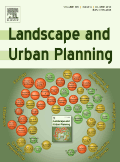
LANDSCAPE AND URBAN PLANNING
Elevating discourse on ecological urban planning.Landscape and Urban Planning is a premier academic journal published by Elsevier, dedicated to the interdisciplinary study of urban environments and landscape management. With a strong focus on ecological, managerial, and policy-driven aspects of urban and landscape planning, this journal has achieved a remarkable recognition within its field, boasting a Q1 classification in multiple categories, including Ecology, Urban Studies, and Nature and Landscape Conservation, as evidenced by its impressive Scopus rankings. Researchers can access state-of-the-art studies and innovative methodologies that address contemporary challenges in urbanization and environmental sustainability. Since its inception in 1986, the journal has been instrumental in shaping the discourse on landscape and urban planning, making it an essential resource for academics, professionals, and students alike who seek to contribute to the sustainable development of urban areas. The journal's accessible content, backed by a strong editorial board and rigorous peer-review process, ensures that published findings remain at the forefront of research in these critical disciplines.

Urban Science
Unveiling Insights into Urban EnvironmentsUrban Science, published by MDPI in Switzerland, is a pioneering open access journal that has been serving the academic community since 2017. With a robust focus on understanding urban environments through various interdisciplinary lenses such as Environmental Science, Geography, Planning and Development, and Urban Studies, this journal aims to advance knowledge on the complexities of urban living and the challenges that modern cities face. Recognized for its impact, Urban Science holds prestigious rankings, including Q1 in Urban Studies and Q2 in multiple relevant categories. Its presence in leading databases like Scopus, where it stands among the top percentile ranks, underscores its contribution to critical dialogues in urban research. The journal’s commitment to accessibility, targeted toward researchers, professionals, and students alike, fosters an inclusive platform for disseminating innovative ideas and solutions necessary for sustainable urban development.
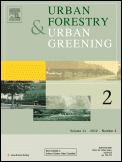
URBAN FORESTRY & URBAN GREENING
Enhancing biodiversity in the heart of our cities.URBAN FORESTRY & URBAN GREENING is a premier interdisciplinary journal published by Elsevier GmbH, dedicated to advancing the fields of urban forestry and sustainable greening practices. With an impressive impact factor and consistently ranked in Q1 across ecology, forestry, and soil science disciplines, this journal offers valuable insights into the vital roles of urban vegetation in enhancing environmental quality and biodiversity. Since its inception in 2002, it has served as a crucial platform for innovative research, showcasing studies that address the challenges and opportunities of integrating green spaces within urban landscapes. The journal's commitment to publishing high-quality articles ensures that researchers, professionals, and students stay at the forefront of the latest scientific developments, reinforcing its significance in shaping urban environmental policy and practice. For those seeking to contribute to this vibrant field, URBAN FORESTRY & URBAN GREENING remains a vital resource for sharing knowledge and fostering collaboration among experts.

Bitacora Urbano Territorial
Championing Open Access for a Collaborative Academic CommunityBitacora Urbano Territorial is an esteemed open-access journal published by Universidad Nacional de Colombia, dedicated to advancing research in the intricate fields of urban studies, geography, and the arts and humanities. Since its inception in 2009, this journal has become a vital platform for academics, practitioners, and students alike in analyzing and addressing the multifaceted dimensions of urbanization, spatial planning, and territorial development. With an evolving focus and a commitment to fostering scholarly dialogue, Bitacora Urbano Territorial proudly holds a Q2 ranking in Arts and Humanities (miscellaneous) and Q3 rankings in both Geography, Planning and Development and Urban Studies, reflecting its growing impact within the academic community. The journal welcomes contributions that explore innovative research, case studies, and theoretical advancements, providing a comprehensive reflection of urban transformations in Latin America and beyond. Emphasizing accessibility, the journal has embraced an open access model since 2016, ensuring that critical knowledge is disseminated widely to enhance understanding and promote collaboration across disciplines.
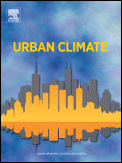
Urban Climate
Innovating Solutions for Climate-Ready Urban EnvironmentsUrban Climate, published by Elsevier, is a leading peer-reviewed journal dedicated to advancing the understanding of interactions between urban areas and climate patterns. Since its inception in 2012, the journal has achieved an impressive reputation, currently holding a Q1 ranking in multiple categories, including Atmospheric Science, Environmental Science, Geography, Planning and Development, and Urban Studies. This positions it as a vital resource for researchers, professionals, and students interested in the multifaceted dynamics of urban environments and their climatic impacts. With an overarching goal to foster interdisciplinary collaboration, Urban Climate serves as a platform for innovative research designed to inform city planning and policy, enhance sustainability, and address climate-related challenges in urban settings. As the only journal solely focused on urban climate issues, it stands out as a crucial contributor to the academic discourse in this field, promoting open discussions and providing accessible insights critical for shaping resilient urban futures.
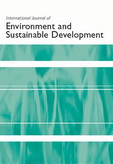
International Journal of Environment and Sustainable Development
Connecting disciplines for environmental progress.The International Journal of Environment and Sustainable Development, published by INDERSCIENCE ENTERPRISES LTD, serves as a vital platform for researchers, practitioners, and policymakers engaged in the multidisciplinary fields of geography, renewable energy, and environmental sustainability. With an ISSN of 1474-6778 and an E-ISSN of 1478-7466, this journal has been disseminating critical research since its inception in 2002 and continues to expand its scope through 2024. Recognized within the Q3 quartile in Geography, Planning and Development and Q4 in both Management, Monitoring, Policy and Law and Renewable Energy, Sustainability and the Environment, it provides valuable insights into contemporary issues affecting our planet. While access options are limited to non-open access formats, the journal remains essential for those seeking to enhance their understanding of sustainable development practices and policies in a global context. The International Journal of Environment and Sustainable Development is not only an academic repository but also a catalyst for dialogue and innovation within the environmental sciences.
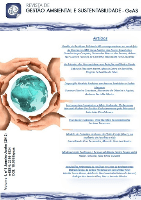
Revista de Gestao Ambiental e Sustentabilidade-GeAS
Advancing Sustainable Solutions for a Greener TomorrowRevista de Gestao Ambiental e Sustentabilidade-GeAS, an esteemed open-access journal published by UNIV NOVE JULHO in Brazil, focuses on critical issues related to environmental management and sustainability, fostering interdisciplinary research that spans Geography, Urban Studies, and Environmental Science. With its commitment to accessibility since 2012, GeAS serves as a vital platform for researchers, professionals, and students to disseminate knowledge and innovative solutions in the realm of sustainability. Although it currently holds a Q4 ranking in Geography, Planning and Development and Management, Monitoring, Policy and Law, and Q3 in Urban Studies as of 2023, the journal aims to elevate its impact within these fields. It is uniquely positioned to contribute to the dialogue on environmental issues, policy implications, and urban development challenges in a rapidly evolving world. The journal's location in São Paulo further enriches its relevance and expertise in addressing both local and global environmental concerns.

Regional Sustainability
Transforming urban landscapes with sustainable practices.Regional Sustainability is a premier open access journal published by KEAI PUBLISHING LTD, devoted to the interdisciplinary exploration of sustainable practices within urban and regional contexts. Since its inception in 2020, this journal has quickly established itself as a leading platform for innovative research, currently holding a strong position in category quartiles, including Q1 rankings in Development and Geography, Planning and Development in 2023. With its broad scope encompassing essential themes in Renewable Energy and Urban Studies, Regional Sustainability provides valuable insights and advances knowledge critical for sustainable development, drawing contributions from scholars and practitioners worldwide. The journal’s impressive Scopus rankings underscore its significance with a percentile rank of 87th in both Urban Studies and Development, making it essential reading for researchers and policymakers alike. The journal is headquartered in Beijing, China, and is committed to disseminating high-quality research that addresses contemporary challenges in sustainability.

Ciudades-Revista del Instituto Universitario de Urbanistica de la Universidad de Valladolid
Shaping Sustainable Cities through ResearchCiudades-Revista del Instituto Universitario de Urbanistica de la Universidad de Valladolid, ISSN 1133-6579, is a premier open-access journal established in 1993, published by the esteemed Universidad de Valladolid, Secretaría de Publicaciones. Located in Spain, this journal provides a vital platform for scholarly articles that address contemporary issues in urbanism, conservation, and geography. With a commendable Q1 ranking in Conservation and notable positions in Urban Studies and Geography, the journal is recognized for its contribution to advancing knowledge and practices in urban development and planning. The Scopus rankings illustrate its relevance, particularly in the arts and humanities, where it holds a distinct position amongst its peers. Researchers, professionals, and students will find the journal an essential resource for innovative ideas and discussions that shape urban landscapes and foster sustainable practices. Access to articles is freely available to promote widespread dissemination and collaboration within the academic community.
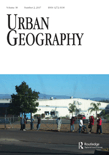
URBAN GEOGRAPHY
Empowering Scholars to Reimagine Urban SpacesURBAN GEOGRAPHY, published by Routledge Journals, Taylor & Francis Ltd, is a leading interdisciplinary journal that has been at the forefront of urban studies since its inception in 1980. With an impact factor that positions it in the prestigious Q1 category in both Geography, Planning and Development and Urban Studies, this journal is recognized for its rigorous research that informs policy and practice in urban environments. With a Scopus ranking of #20 out of 279 in the field of Urban Studies and #79 out of 821 in Geography, Planning and Development, it offers valuable insights for scholars, professionals, and students alike—enhancing our understanding of the complex dynamics that shape urban spaces. URBAN GEOGRAPHY is pivotal for those looking to advance their expertise in urban analytical frameworks, urbanization trends, and sustainable development strategies. Submissions are welcomed from a diverse range of perspectives, making it a vital resource for anyone invested in the future of urban landscapes.